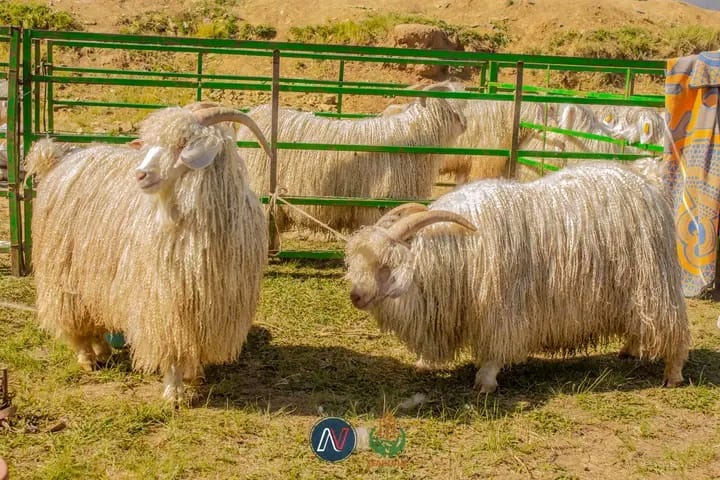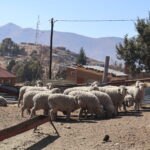Libuseng Molato
At the heart of Thaba-Tseka’s rugged terrain lies an inspiring story of dedication, passion, and remarkable achievement.
Feisane Mpeoa, recently crowned Farmer of the Year at the National Wool and Mohair Growers showcase, shares his journey from humble beginnings to becoming a leading figure in the wool and mohair industry.
His success story not only highlights his personal triumphs but also underscores the potential of Lesotho’s agricultural sector.
A Passion Ignited
The showcase, held on April 25th at the Lesotho Agricultural College grounds, celebrated the achievements of farmers across the country. Among the many stories of perseverance and products portraying perfection, Mpeoa’s stood out.
Born and raised in Mantšonyane in the Thaba-Tseka district, Mpeoa says his love for animals was evident from a young age.
In 2005, driven by this passion, he recalls deciding to venture into sheep rearing, starting with 63 female sheep and a single ram, all sourced locally.
“Mokonyane Tšiame (another acclaimed wool and mohair farmer) rekindled my love for sheep,” Mpeoa recalls fondly.
It was during a visit to Mokonyane’s farm in Mapoteng that Mpeoa’s perspective on sheep farming changed forever.
“I went to buy just one ram, but I changed my mind and came back with two other ewes because of what I saw and how he explained the virtues of the Merino sheep and Angora goats,” he recounts.
Building a Legacy
Mpeoa’s journey is a testament to the importance of continuous learning and adaptation in farming.
He says in a quest to continue improving, in 2010, he attended a training program at Mega Merino in South Africa and immersed himself in agricultural literature.
“Learning is very important, and it is best when doing practical work because we get to experiment,” he emphasises.
His dedication to learning and innovation bore fruit for he mastered the art of nutritious feeding, understanding the critical role of nutrition in animal health and product quality.
“A farmer has to be more careful when feeding. One has to be mindful of feeding before breeding, during breeding, pregnancy, and after birth,” he explains.
His meticulous approach resulted in sheep producing high-quality mohair, with a 90% clean density, significantly higher than the industry average, all attributes that saw him crowned a champion.
Overcoming Challenges
Despite his success, Mpeoa says he still faces significant challenges, particularly in securing suitable land for farming.
“The industry has good profits, but we spend more than 30% of our profits on animal feeds,” he laments, advocating for better land allocation policies to support farmers.
“I managed to buy my land, but the challenge is that there is no exception area for farming in Lesotho as people are given land for housing. This has left access to agricultural land shrinking by the minute,” he explains.
Mpeoa’s innovative spirit extends to cost management. He grows fodder, which regrows after a certain period, reducing feed costs and ensuring his sheep have continuous access to nutrition.
“Having a bigger land does not only cut costs but also helps in the well-being of animals as they graze and strengthen their knuckles,” he notes.
A Vision for the Future
Mpeoa’s achievements are not just personal milestones but contributions to the broader agricultural community. He employs over fifteen people, demonstrating farming’s potential to create jobs and reduce unemployment in Lesotho. His vision is expansive; he aims to increase his flock to 1,000 sheep, producing over 500 lambs every six months.
“Since I ventured into the industry, I have always been among the champions or became the best like this year,” Mpeoa proudly states.
He says his investments in a tractor and a butcher shop, which processes animals unworthy of breeding are testaments to his strategic thinking and commitment to quality.
Collaboration and Community
Mpeoa who is also a crop farmer believes in the power of collaboration among farmers.
“There has to be a very good relationship in farming for Lesotho to achieve the success that it deserves. For example, those who grow crops like maize should not sell at higher prices because they are producers and are at the bottom of the value chain. They should sell their produce immediately after harvest and not wait for the time when the demand is too high. At present we see farmers selling without the understanding of the market value chain. Farmers also need to work together to be able to fit a large market demand,” he advises.
This collaborative spirit, he believes, is key to sustaining and growing Lesotho’s agricultural sector.
Inspiring the Next Generation
Regarding himself as a passionate advocate for youth involvement in agriculture, Mpeoa encourages young people to consider careers in merino and angora rearing.
“We had a great farmer called Matela Tšita from Mokhotlong, and after his death due to COVID-19, we have seen no progress in his farm. Our own children do not want to involve themselves in the industry and that’s an unfortunate thing because we need more young blood to join in on the race,” he laments, however notes he is hopeful.
He points to the presence of young farmers at the national showcase, which he sees as a promising sign for the future.
“I believe my story is about resilience, innovation, and unwavering dedication. From a small-scale sheep farmer to a beacon of excellence in Lesotho’s wool and mohair industry should be an inspiration to many as my achievements highlight the industry’s potential and serve as a clarion call for better support and collaboration among farmers,” he says.
He notes that as Lesotho continues to navigate the challenges of agricultural development many other Mpeoas are pushing to collect different victories and painting a bright picture that stands as a testament to what can be achieved with passion, knowledge, and perseverance.
Summary
- “I went to buy just one ram, but I changed my mind and came back with two other ewes because of what I saw and how he explained the virtues of the Merino sheep and Angora goats,” he recounts.
- He says in a quest to continue improving, in 2010, he attended a training program at Mega Merino in South Africa and immersed himself in agricultural literature.
- He says his investments in a tractor and a butcher shop, which processes animals unworthy of breeding are testaments to his strategic thinking and commitment to quality.

Your Trusted Source for News and Insights in Lesotho!
At Newsday Media, we are passionate about delivering accurate, timely, and engaging news and multimedia content to our diverse audience. Founded with the vision of revolutionizing the media landscape in Lesotho, we have grown into a leading hybrid media company that blends traditional journalism with innovative digital platforms.









